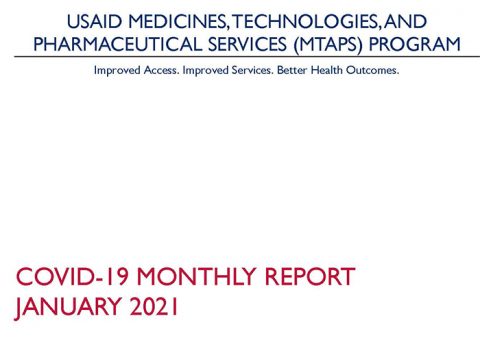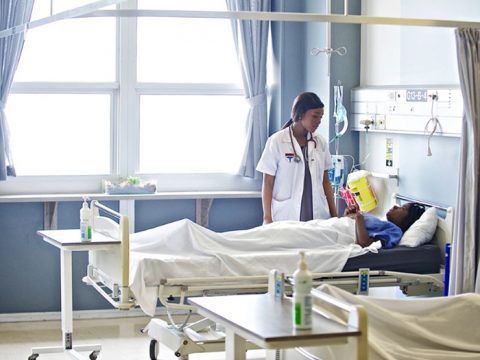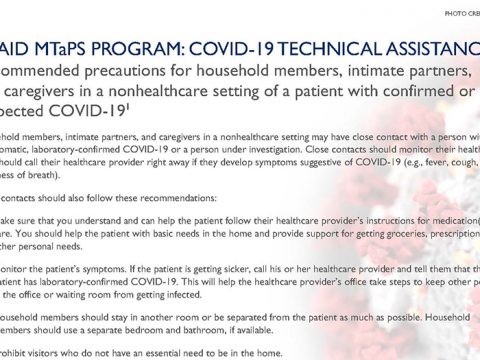Why We Strengthened Pharmaceutical Systems?
Strong healthcare systems save lives and reduce the risk of future pandemics. But in many low-and-middle income countries, there is still limited access to medicines, and often limited regulation or enforcement on poor-quality or falsified medicines. Without reliable pharmaceutical systems in place, these ineffective or harmful medicines can lead to poor health outcomes, including treatment failures and avoidable deaths.
USAID MTaPS identified and helped countries address the source of health system gaps to promote better supply chain management, stronger policy and governance, sustainable financing, and improved healthcare workers expertise.
Fortunately, there was a lot of measurable impact MtaPs achieved in improving public health and providing access to life-saving medicines.
Read MTaPS impact stories.
MTaPS' Focused Approach
MTaPS health strengthening approaches were based on whole-of-society engagement, locally driven solutions, and building countries capacity to avert infectious threats.
As low-and-middle-income countries face a shortage of medicines and inadequate supply chains that could weaken already vulnerable health systems, USAID MTaPS worked with 16 countries in Africa and Asia to scale up access to pharmaceutical services.
- In Madagascar, MTaPS saved children’s lives from pneumonia through improved access to amoxicillin.
- In Cameroon, MTaPS delivered critical polio, measles, yellow fever, and COVID-19 vaccines to hard-to-reach communities and trained 1,000+ community health workers on immunization strategies to further prevent disease.
- In Bangladesh, MTaPS supported the national scale-up of a digital tool to help end Tuberculosis (TB) as Bangladesh has among the highest rates of TB and multidrug-resistant TB (MDR-TB) in the world.
- In Senegal, MTaPS played a critical role in overseeing and implementing infection prevention and control in hospitals, which was pivotal in containing the emergence of antimicrobial resistance (AMR).
Collectively, our efforts have made a measurable difference. The approach that accelerated these efforts into action include a focus on eight technical areas.
Pharmaceutical Systems Strengthening (PSS) Technical Areas
 Governance Strengthened pharmaceutical sector governance
Governance Strengthened pharmaceutical sector governance
 Regulatory Systems Improved national regulatory systems and promoted cooperation across regions and continents
Regulatory Systems Improved national regulatory systems and promoted cooperation across regions and continents
 Capacity Building Strengthened institutions and trained staff to improve how pharmaceuticals are managed and services are provided
Capacity Building Strengthened institutions and trained staff to improve how pharmaceuticals are managed and services are provided
 Information Systems Expanded access to pharmaceutical information to support better decision-making
Information Systems Expanded access to pharmaceutical information to support better decision-making
 Financing Improved funding strategies for the pharmaceutical sector including how resources are distributed and spent
Financing Improved funding strategies for the pharmaceutical sector including how resources are distributed and spent
 Supply Chain Management Strengthened supply chain management
Supply Chain Management Strengthened supply chain management
 Pharmaceutical Services Improved pharmaceutical services, including pharmacovigilance, antimicrobial resistance, and patient-centered care
Pharmaceutical Services Improved pharmaceutical services, including pharmacovigilance, antimicrobial resistance, and patient-centered care
Health Areas
Reliable access to safe and effective medicines, along with their proper use, is crucial for stopping epidemics and saving lives. During the past five years, USAID MTaPS has successfully worked with countries to drive better health outcomes with a focus on the following health areas:
Supporting the Global Health Security Agenda
As part of its mission, MTaPS supported USAID’s work under the Global Health Security Agenda to fight antimicrobial resistance which threatens the effectiveness of treatments worldwide. To meet its goal of improving pharmaceutical services for better health results, MTaPS focused on helping countries build their ability to use antimicrobials wisely and prevent infectious disease threats, protecting health both nationally and globally.


